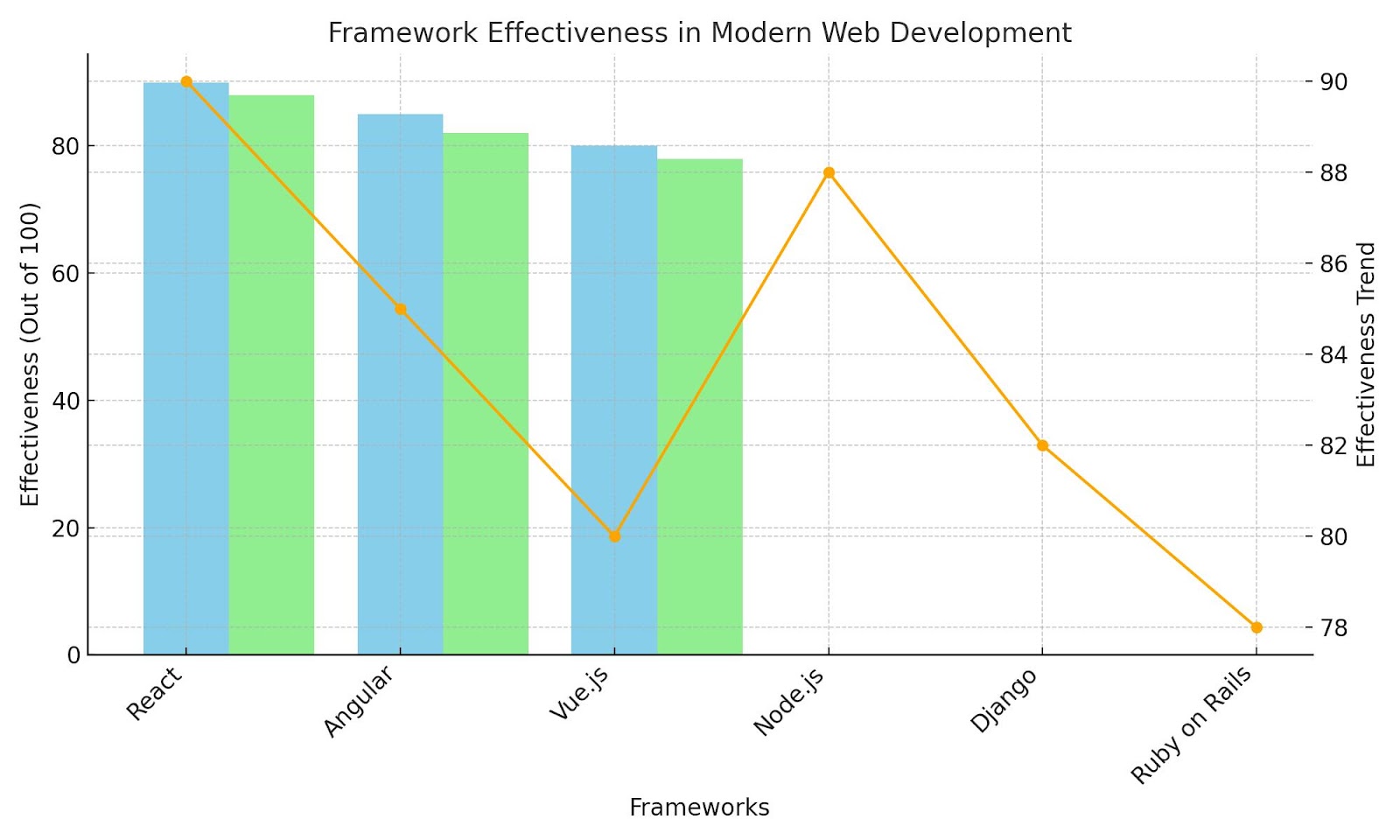
Framework website development means using pre-built tools and libraries to make building websites and web applications faster and easier. These frameworks help developers create organized, efficient, and secure sites. With the rise of modern web applications, frameworks have become even more important, providing solutions that speed up development and improve user experience. As businesses and users expect faster and more interactive websites, frameworks have become a key part of creating modern web applications.
The Advantages of Using Frameworks in Website Development
Using frameworks to build websites has many benefits. First, frameworks speed up the development process by providing ready-made tools and templates, so developers don’t have to start from scratch. They also help keep the code organized and consistent, making it easier to maintain and update the site in the future. Plus, frameworks often come with security features that protect the site from common threats, keeping it safe from cyberattacks.
- Speed and Efficiency: Frameworks save time by providing tools that help developers work faster.
- Consistency and Structure: They make the code more organized and easier to manage.
- Improved Security: Frameworks offer built-in security features to protect websites from common threats.
Frameworks and Scalability
Framework website development is key to making websites grow as your business does. As more people visit your site and more data is added, frameworks help your website handle the increased traffic without slowing down. They include tools like caching, load balancing, and efficient data management to keep the site running smoothly, even as more users visit or more data is processed. This ensures that your site can handle growth and keep performing well as your business expands.
Enhanced User Experience
Using frameworks in website development makes a big difference in user experience. They help websites load faster, which keeps visitors happy and reduces the chances of them leaving the site. Faster load times mean users can enjoy browsing without delays. Frameworks also ensure that your website looks great and works well on all devices, whether it’s a desktop or a mobile phone, providing a smooth experience for everyone.
- Speeding Up Load Times: Frameworks make websites load faster, which keeps users happy.
- Responsive Design: Websites automatically adjust to different screen sizes, making them easy to use on any device.
Frameworks and Code Maintainability
Framework website development helps keep the code clean and organized. Frameworks make developers follow a clear structure, which keeps everything consistent and easier to maintain. This makes updating or fixing issues in the code much simpler. It also helps teams work together more easily since the well-organized code is simple to understand, even if someone new joins the project. This leads to smoother collaboration and faster progress on the website.
Popular Frameworks for Modern Web Applications
When building modern web applications, there are several well-known frameworks to consider, each offering unique features. For the front-end, React, Angular, and Vue.js are popular choices. These help create dynamic, user-friendly interfaces. For the back-end, Node.js, Django, and Ruby on Rails are widely used to handle server-side tasks, manage databases, and ensure fast performance.
- Front-End Frameworks: React, Angular, and Vue.js are great for creating interactive, easy-to-use interfaces.
- Back-End Frameworks: Node.js, Django, and Ruby on Rails help manage server-side processes and ensure the site runs smoothly.

Security Benefits of Frameworks
Framework website development provides important security benefits for websites. Many frameworks come with built-in security features that protect against common online threats. For instance, they help prevent attacks like SQL injection and cross-site scripting (XSS) by automatically validating data. These features make it much harder for hackers to exploit your site. Plus, frameworks are regularly updated to fix new security issues, keeping your website secure without needing you to handle security fixes yourself.
The Future of Framework Website Development
The future of building web applications will be shaped by how frameworks evolve. As technology keeps improving, frameworks are becoming faster, more flexible, and easier for developers to use. In the coming years, we’ll see trends like more use of JavaScript frameworks for better performance, the integration of AI and machine learning, and a stronger focus on mobile-first development. These changes will help developers create websites that are faster, more interactive, and smarter.
- Increased Use of JavaScript Frameworks: JavaScript frameworks like React, Angular, and Vue.js will continue to be popular because they help create fast, responsive websites. These frameworks make it easier for developers to build websites that work smoothly across all devices.
- Integration with AI and Machine Learning: Future frameworks will include AI and machine learning features to make web applications smarter. This will allow websites to offer personalized experiences, like chatbots or recommendations, making them more engaging and user-friendly.
- Mobile-First Development: As more people use smartphones, frameworks will focus on creating websites that work great on mobile devices first. This will make websites load faster, look better on all devices, and give users a smooth experience, whether they’re on a phone, tablet, or computer.
Final Thoughts
To sum up, frameworks are essential for modern web development because they provide speed, organization, security, and scalability. Expert web developers rely on framework website development to create fast, secure, and efficient websites. As technology keeps advancing, the use of frameworks will keep growing, making them a must-have for building great web applications. The advantages they offer, like easier teamwork and better performance, show that frameworks will continue to be a key part of web development in the future.


